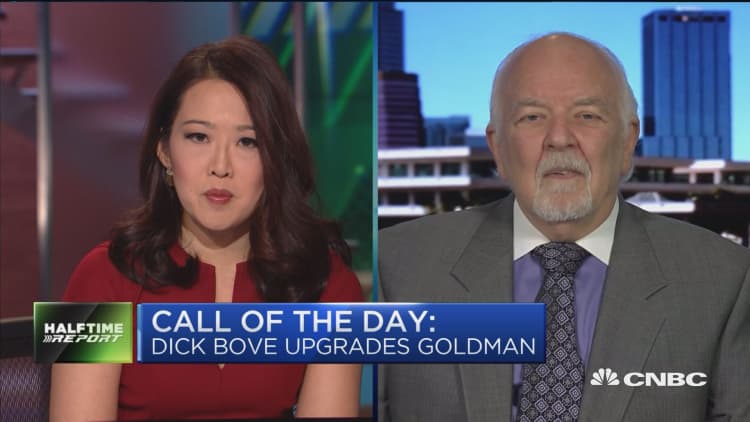
A noted bank stock analyst said in a Friday note that it's time to buy Goldman Sachs, just about a month after saying investors should bet against the stock.
The investing climate today "is exactly the environment Goldman has been preparing for for 10 years," Dick Bove of Vertical Group said Friday in a phone interview with CNBC. "Now it's here."
He added in his report to clients that the investment bank's disclosed $5 billion hit to fourth-quarter earnings from the new tax law "makes the outlook for 2018 somewhat better. This is
the time to buy this stock."
Goldman shares briefly fell more than 1 percent Friday to $253 after news of its filing discussing the tax law's hit to earnings. Bove's upgrade of the stock to buy from hold sees it rising about 9 percent to the new target of just more than $276.
The shares were about 0.4 percent lower midday Friday. The stock has drastically underperformed its peers this year, up just 6.8 percent versus J.P. Morgan Chase's nearly 25 percent gain and even scandal-ridden Wells Fargo's roughly 11 percent rise this year.
"I very definitely think that Goldman Sachs will grow faster than the group" next year, Bove said Friday on CNBC's "Halftime Report." "If the problem at Goldman Sachs was that it failed to diversify to meet whatever the changes were in the financial markets, then it's still a very focused business, and those businesses that it's focused on are the ones that I think will do best over the next two years."
"So I would much rather own Goldman Sachs than any other of the financial companies at this point," he said.
The upgrade officially happened late Thursday afternoon, Bove said, but the note, with an addendum, went out Friday morning.
In late November, Bove said on CNBC's "Trading Nation" that he would "buy Bank of America and short Goldman Sachs." He has also called for the ousting of Goldman CEO Lloyd Blankfein.
"I still think the guy ought to be bounced," Bove said Friday. But "this is the right place, right time for Goldman Sachs to show huge increases in earnings."
What changed in just a few weeks?
Bove said in his research of banks, he found that Goldman was a leader in the growing businesses of corporate dealmaking and stock issuance.
"All of a sudden I said, 'Why the hell am I not buying the stock?'" Bove said.
Goldman Sachs ranks first by participation in global mergers and acquisitions, growing its share of the roughly $3.7 trillion business from about 25.6 percent of deals last year to 26.5 percent this year, according to Dealogic data. A Deloitte survey in September of U.S.-based corporations and private equity firms found executives expect the number of deals and the size of transactions to increase in 2018.
The investment bank is also one of the top five underwriters of global initial public offerings, Dealogic data showed. For this year through Dec. 26, companies globally raised 19 percent more in equity than last year, according to Thomson Reuters Equity Capital Markets (ECM) data.
On Friday, Goldman said in a filing with the Securities and Exchange Commission that the company estimates the new U.S. tax law will hit its fourth-quarter results by $5 billion, primarily due to repatriation provisions.
As a result, Bove said he expects a quarterly loss of $6.64 a share, versus his previous expectation for a profit of $5.42. But the overall effect is positive, the analyst said. "Goldman will use the tax bill associated with repatriation as the basis of taking a number of write-offs to clear up existing problems – the typical 'kitchen sink' approach."
Goldman declined to comment to CNBC on Bove's analysis and call for Blankfein's removal.
The new tax law requires companies to repatriate, or bring back, foreign earnings, beginning in 2018, with the option of paying taxes on those earnings over eight years. The special, one-time tax rate is 8 percent for illiquid assets and 15.5 percent for cash.
The new law also cuts the corporate tax rate to 21 percent from 35 percent. President Donald Trump signed the legislation last Friday.


